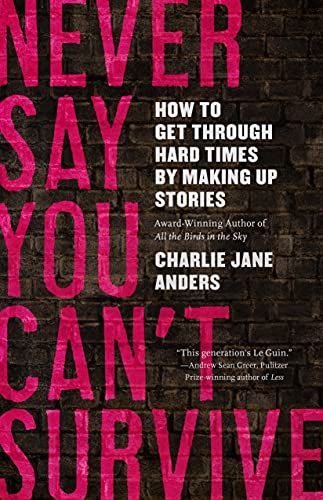Award-winning science fiction author Charlie Jane Anders offers a rich, emotional primer to facing your fears, channeling your emotions and sitting down to write.

Write Who You Are
Combining memoir, personal anecdotes and writing advice, award-winning science fiction and fantasy author Charlie Jane Anders offers guidance for authors: developing characters, mapping plots, imagining new worlds and overcoming writer’s block and imposter syndrome. Inspired by events in her own life and in the world, Anders promotes creativity as an antidote to powerlessness, and imagination as an act of resistance.
Adversity
Due to a learning difficulty, Charlie Jane Anders struggled in school, but one teacher noticed her skill for writing, and encouraged her to develop her talent. Anders’s ability to create fantasy worlds blossomed.
In 2001, Anders began to transition from male to female while writing a novel that addressed her quest for gender identity. She fictionalized her fears and anxieties. In 2017, Anders had panic attacks imagining how the Trump administration would exacerbate life for trans Americans. She wrote to highlight social injustices and showcase her characters surviving obstacles.
In 2020, Anders found writing fiction a welcome reprieve from reality. Family crises, her father’s death from COVID-19 and the pandemic overwhelmed her. However, characters in her stories provided her with company and community. Writing is a form of escapism, she insists. Writers live vicariously through the lives of the personalities they create.
Imposter Syndrome
You might convince yourself you’re not a real writer – or that your writing lacks value – unless your output pays your bills. But if you write even one sentence a day, you’re a writer, insists Anders.
You never really know what a story is worth, or who will discover it and fall in love with it. Every writer is just throwing stuff out there and seeing what sticks to the wall, and we all have hits and misses.Charlie Jane Anders
Imposter syndrome can impede your writing because you feel insecure. Find encouraging communities who support your dreams, and take pleasure in your writing process.
Story Ideas
As a writer, you’ll dream up myriad ideas, but most won’t come to fruition, admits Anders. A story might take you down a meandering path, or come to a dead end. Sometimes, a sexy idea fizzles out and a less immediately alluring story gets under your skin.
But my happiest writing times are usually when I’m seducing a story, and being seduced in turn.Charlie Jane Anders
You don’t have to finish everything you start. Abandon a story that’s not working. You might revisit it later. Don’t beat yourself up. Recognize the limitless abundance of story ideas and move on to another.
Imaginary Friends
Anders has found that obsessing over the tribulations and triumphs of her characters helped her to escape her own sufferings.
A good character usually has as much story behind them as ahead of them. We might only need to glimpse their past, but we should know that they’ve already been on the journey before the story even begins.Charlie Jane Anders
To create an interesting character, get curious about a setting – a place, time or event – you’d like to explore. Imagine a person in that scenario undergoing a transformation. Picture his or her character arc. The most interesting characters evolve like a lump of coal that, under immense pressure, transforms into a diamond. Your central character should be flawed. Experiment to allow a unique personality to emerge. Put the character in a crisis to see how he or she reacts.
Embrace Spontaneity
If you experience writer’s block, try writing a single interesting scene that progresses the story, followed by another, advises Anders. String the scenes together to shape your story. It’s a myth that good stories are either character-based or plot-based. In fact, characters rely on action to develop, and a good plot relies on characters with depth.
Using trauma as a plot device is a cheap trick, warns Anders. Characters don’t need to suffer gratuitous violence or pain. But if a character does undergo trauma, treat the matter with the gravity it deserves; don’t have your character shrug off a harrowing ordeal.
Emotions
Living in frustrating or painful times can fuel your anger. Channel your anger to help you tap into kindness, humor, regret, fear, happiness and hurt. Harness your fury against injustice and oppression to make your writing cathartic.
When people feel increasingly isolated, the world needs books that examine relationships between characters who find connection despite their faults. Seek chemistry between your characters. Give them meaningful interactions that advance the storyline. Review your characters’ emotions. Tear your plot to shreds, if necessary, to make sure your characters’ emotional responses are true.
A Political Act
Every story has a political background, notes Anders, because every author’s assumptions color the story. Consider any message you may send unintentionally. Avoid obvious allegories in favor of messy human lives that catch the reader’s imagination and operate on at a deeper level of meaning.
Let your identity struggles – your culture, gender, religion, sexuality or disability, – percolate into your writing. Representing marginalized groups in fiction reveals the world as it is. But you shouldn’t write a book about a minority unless you have firsthand experience of that culture.
Your Story
Express your uniqueness. A strong narrator creates storytelling magic. The narrator’s personality sets the story’s tone.
Your writing style is a nice snuggly blanket, embroidered with pretty flowers, that will keep you safe and warm when the world is a cold and inhospitable place.Charlie Jane Anders
Prose allows writers to experiment with chronology. You can write linearly or start in the middle and jump back and forth in time. Create a plan after your first draft to pace and structure your story.
Build toward a crisis point, after which events roll with increasing momentum. The ending should be surprising but make sense. It needn’t tie up every loose end, but your readers must understand that your characters have irrevocably changed.
Heartfelt Mentoring
Charlie Jane Anders offers a deeply personal treatise that is as much a survival manual for coping with calamities as a blueprint for crafting stories. With remarkable candor, Anders bravely presents her own confusions, traumas and setbacks as integral to her writing process and writing inspiration. Anders urges you to muster the courage to embrace your flaws, traumas and doubts, not as impediments to your writing but as the very fuel for it. She provides frank advice regarding the practical aspects of being an author. This is an essential guidebook for all aspiring writers.
Charlie Jane Anders also wrote the Hugo Award-winning Six Months, Three Days and the Nebula Award–winning All the Birds in the Sky.








